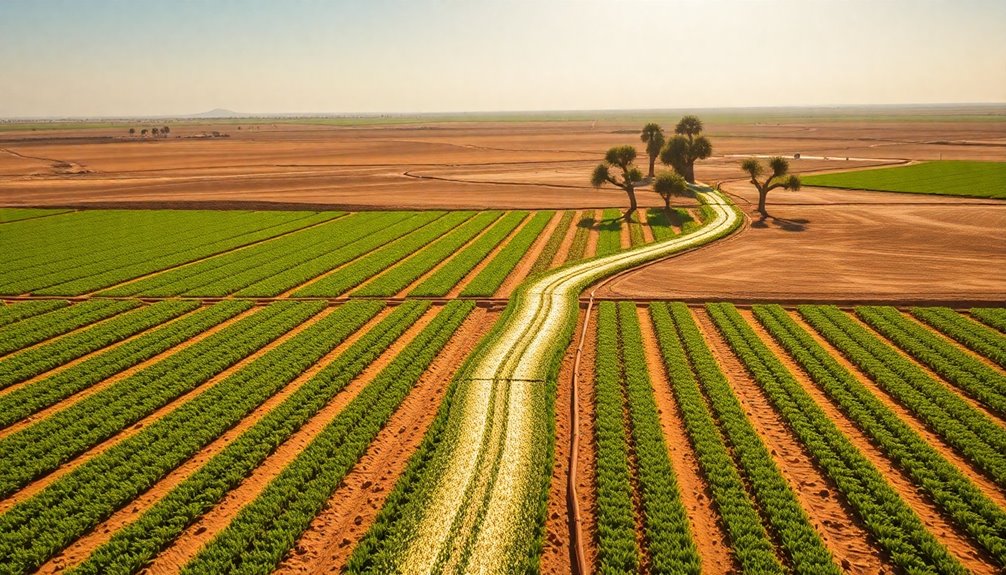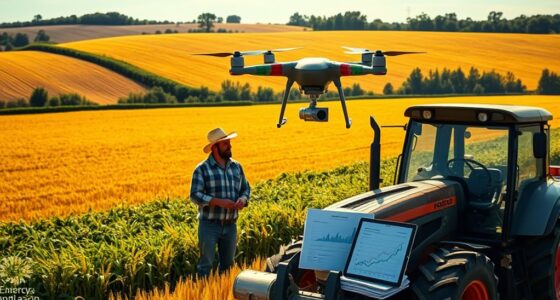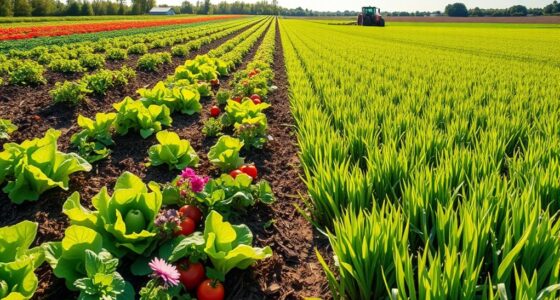To start farming, you need to set clear goals and understand what you want to achieve. Research local resources, such as agricultural extension services and online courses, to gain essential knowledge. Next, evaluate your land for suitability, consider zoning regulations, and make a business plan outlining your objectives and financial projections. Embrace sustainable practices like crop rotation and efficient irrigation methods to boost productivity and protect the environment. Each step you take builds a strong foundation for success. As you explore the journey ahead, there's more to uncover to help you thrive as a farmer.
Key Takeaways
- Define clear farming goals and measurable targets to guide your farming decisions and align with market demand.
- Research available resources, including local extension services, online courses, and farming associations for education and support.
- Evaluate your land by testing soil fertility, assessing water sources, and understanding local regulations for optimal farming practices.
- Develop a comprehensive business plan that includes financial projections, marketing strategies, and flexibility for market changes.
- Implement sustainable farming practices, such as crop rotation and efficient irrigation, to enhance productivity and protect the environment.
Define Your Farming Goals
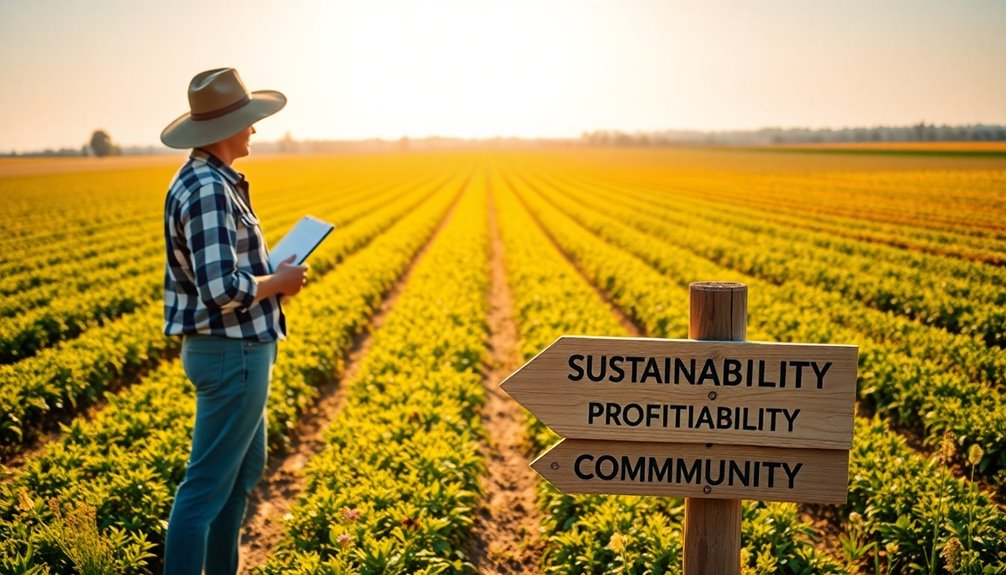
Defining your farming goals is essential, as it sets the foundation for your entire venture. Start by identifying specific objectives, like focusing on food production or small-scale farming. These goals will guide your decisions and help you create a solid business plan.
Set measurable targets, such as the amount of produce you aim to grow or the number of local markets you want to reach. Regularly reassess these goals to guarantee they align with market demand and your financial viability.
Engaging with agricultural extension services or experienced farmers can provide valuable insights, refining your approach and enhancing your farming practices. Ultimately, clear farming goals will steer your path to a successful farm.
Research and Education Resources

Knowledge is power in farming, and leveraging the right research and education resources can greatly enhance your success.
Start by utilizing local agricultural extension services, where agricultural experts provide tailored advice for your region.
Explore online courses on platforms like Coursera and Udemy to learn about crop cultivation, livestock management, and sustainable farming practices.
Joining farming associations, such as the National Farmers Union, opens doors to workshops and valuable mentorship opportunities from experienced farmers.
Additionally, read books and case studies on successful farms to gain practical insights.
Don't forget to attend local agricultural fairs and expos, where you can connect with industry professionals, discover new technologies, and find resources that'll support your farming journey.
Evaluate Land and Regulations

How do you guarantee your farming venture starts on solid ground? Start by carefully evaluating land and understanding regulations. Here are four essential steps:
- Conduct soil testing to assess fertility and composition, ensuring you choose appropriate crops and sustainable farming practices.
- Identify safe water sources for irrigation and livestock, as water quality directly affects crop yield and health.
- Analyze topography to optimize your farm layout, improving drainage and water management.
- Familiarize yourself with zoning regulations and water rights, as compliance is vital to avoid legal conflicts.
Consult agricultural professionals for advice on land conservation and any easements that may impact land use.
Develop a Business Plan

A solid business plan is the backbone of any successful farming venture. It should clearly outline your farming goals, target market, and production methods, serving as a roadmap to success.
Include detailed financial projections that account for anticipated expenses, revenue streams, and a break-even analysis to guarantee economic viability.
Don't overlook the importance of a marketing strategy; this will help you reach potential customers effectively by detailing your branding, advertising methods, and sales channels.
Utilize resources to help, like the USDA's templates for business plans, to create a detailed and effective plan.
Finally, make certain your business plan is flexible, allowing adjustments based on market trends and operational changes, critical for thriving in the dynamic farming landscape.
Implement Sustainable Practices
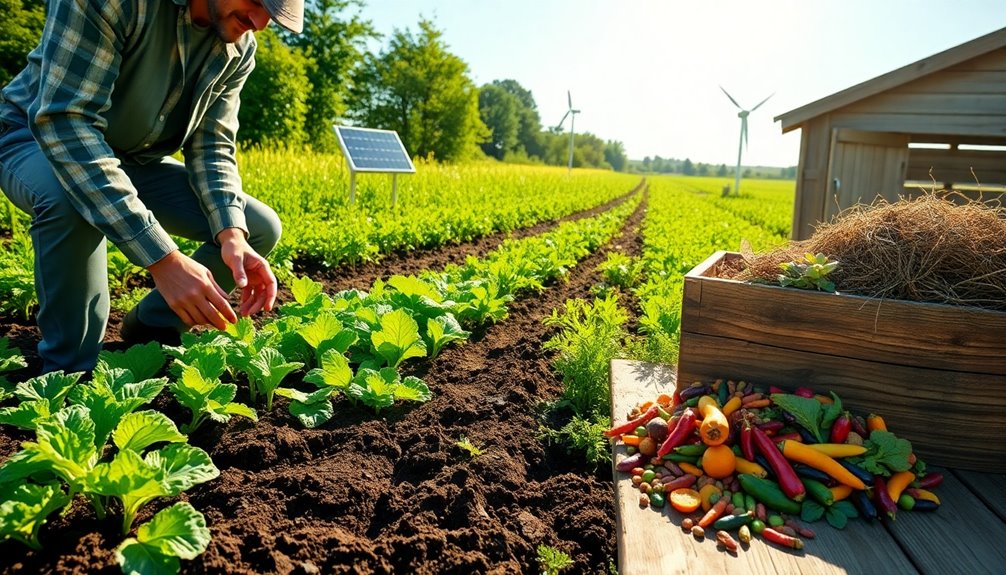
Sustainable practices are essential for modern farming, offering numerous benefits that enhance both productivity and environmental health.
By implementing these strategies, you can improve soil health, reduce costs, and meet market demands.
Here are four key practices to contemplate:
- Crop Rotation: This technique enhances soil health and reduces pest populations, potentially increasing yields by 20%.
- Cover Crops: Use these during the off-season to improve soil structure and boost organic matter by 25%.
- Livestock Integration: Incorporate livestock for better nutrient cycling, cutting chemical fertilizer use by 30%.
- Irrigation Systems: Adopt efficient systems like drip irrigation to reduce water usage by 50% while increasing crop productivity by up to 90%.
Frequently Asked Questions
How to Start a Farm for Beginners?
To start a farm as a beginner, you'll want to begin with thorough market research to understand local demand for crops or livestock.
Create a solid business plan detailing your goals and target market.
Assess your resources, like land and equipment, and consider starting small to manage risks.
Joining local agricultural networks can also provide valuable mentorship and insights, helping you grow your knowledge and support system as you initiate your farming journey.
How Do I Start a Farming Career?
If you think starting a farming career is as easy as planting a seed and watching it grow, think again!
You've got to dive deep into your passion for farming and understand its many demands. Craft a detailed business plan that outlines your goals and market.
Start small with a niche, and tap into local resources for knowledge. Stay sharp on market trends, and soon, you'll be reaping the rewards of your hard work!
How to Farm Step by Step?
To farm step by step, start by defining your goals clearly.
Research suitable crops or livestock for your climate and soil.
Create a detailed business plan that outlines your methods and financial projections.
Secure financing through loans or grants, using your plan to attract support.
Finally, implement sustainable practices like crop rotation and efficient irrigation to guarantee long-term success.
Following these steps will guide you toward a productive farming journey.
How Do Farmers Become Successful?
To become a successful farmer, you need to create a detailed business plan that outlines your goals and production methods.
Diversifying your crops and livestock can boost income and reduce risks.
Building strong relationships with local consumers and markets through direct sales is essential for increasing revenue.
Adopting sustainable practices will attract eco-conscious customers, while continuous education and networking with fellow farmers will provide valuable insights to help you thrive in the industry.
Conclusion
By now, you're equipped with the essential steps to commence your farming journey. Remember, the road to success isn't always smooth—like maneuvering a horse and buggy through modern traffic—but with determination and the right knowledge, you can thrive. Keep your goals clear, stay informed, and adapt to challenges as they arise. With perseverance and sustainable practices, you'll cultivate not just crops, but a rewarding lifestyle. Now, it's time to roll up your sleeves and get started!


